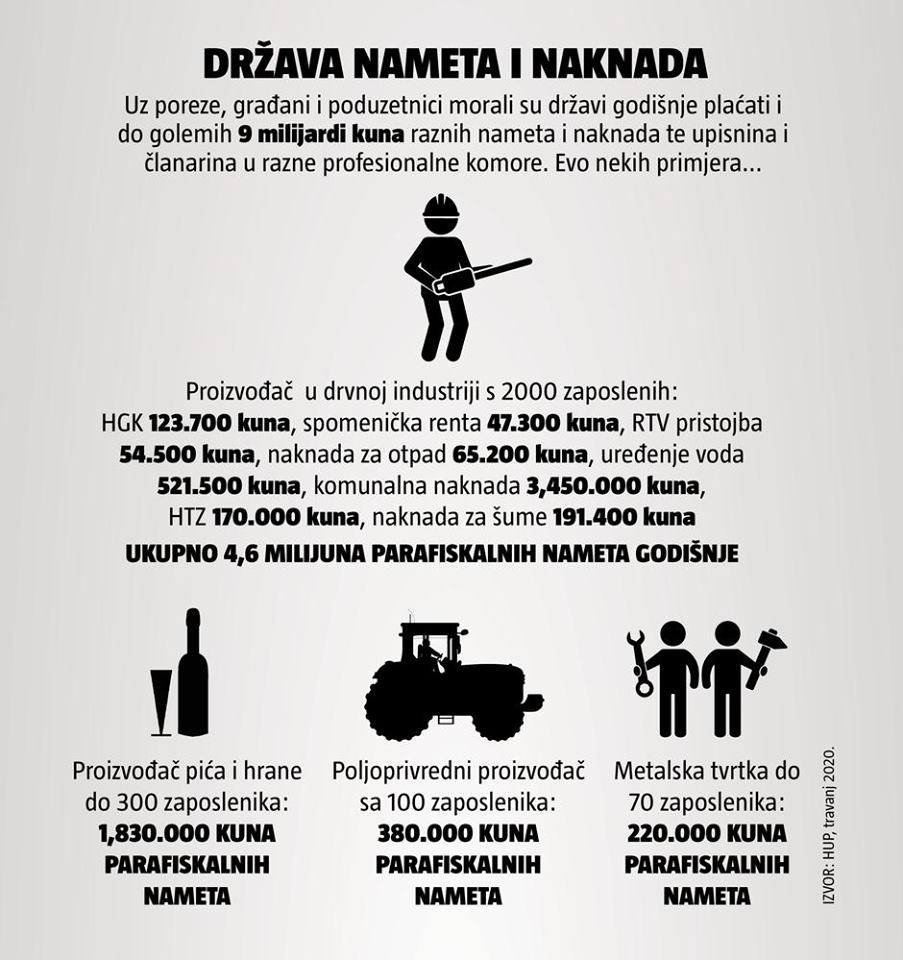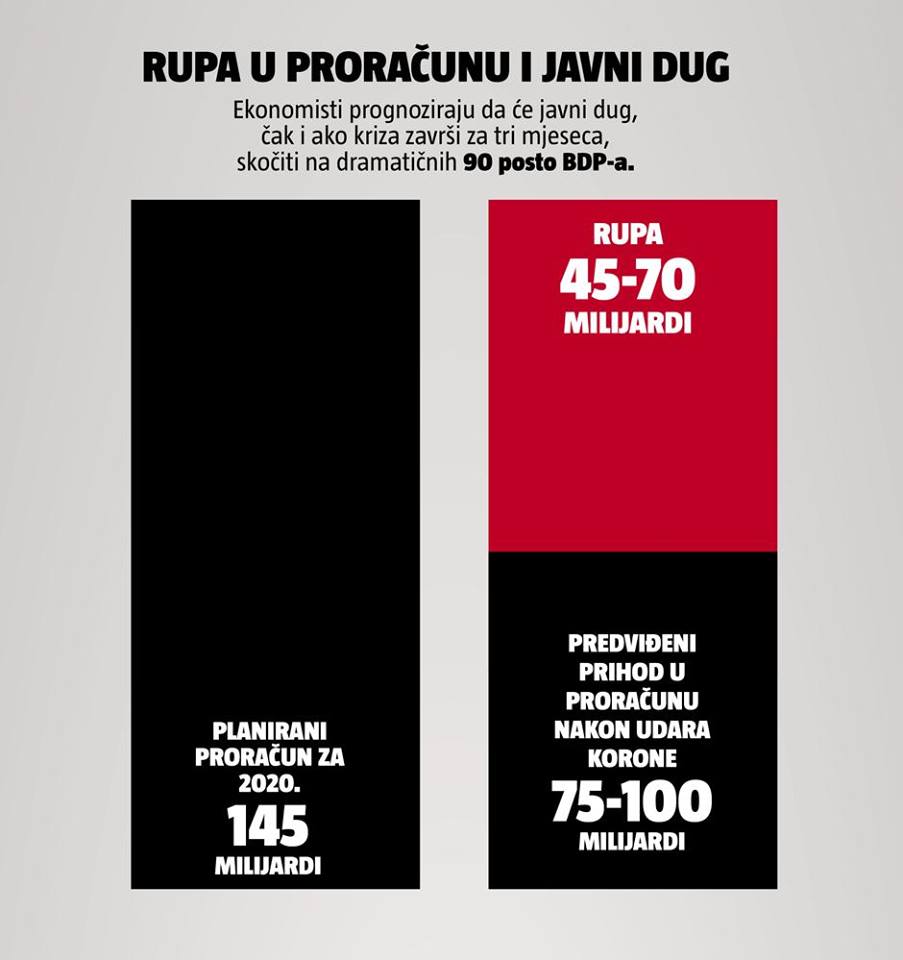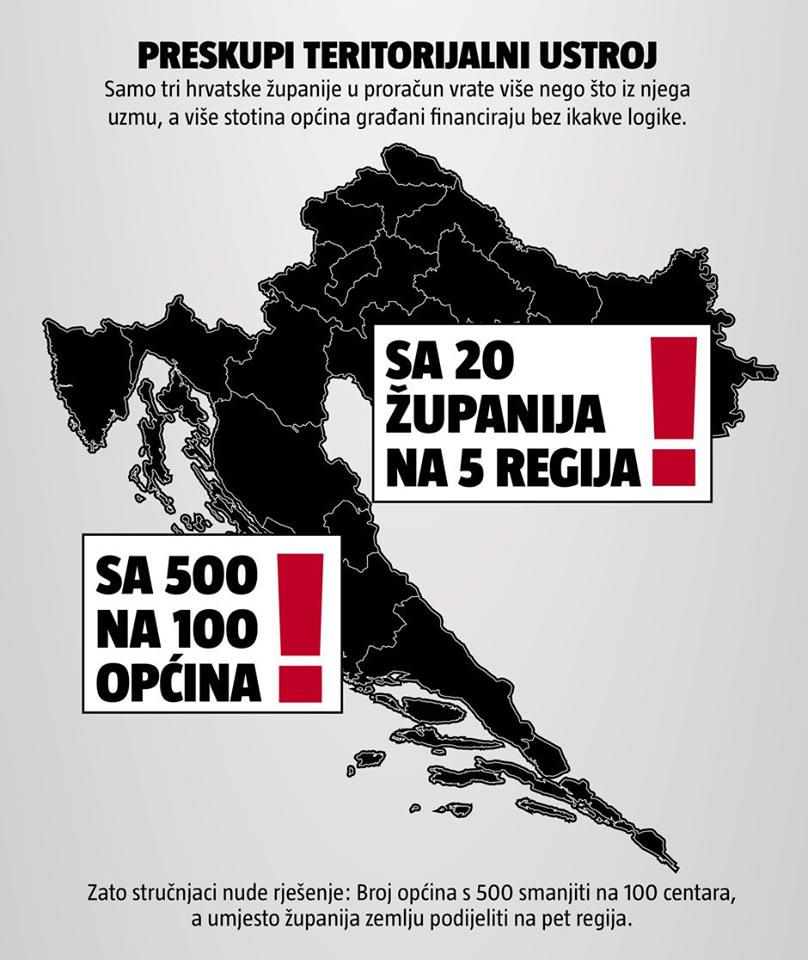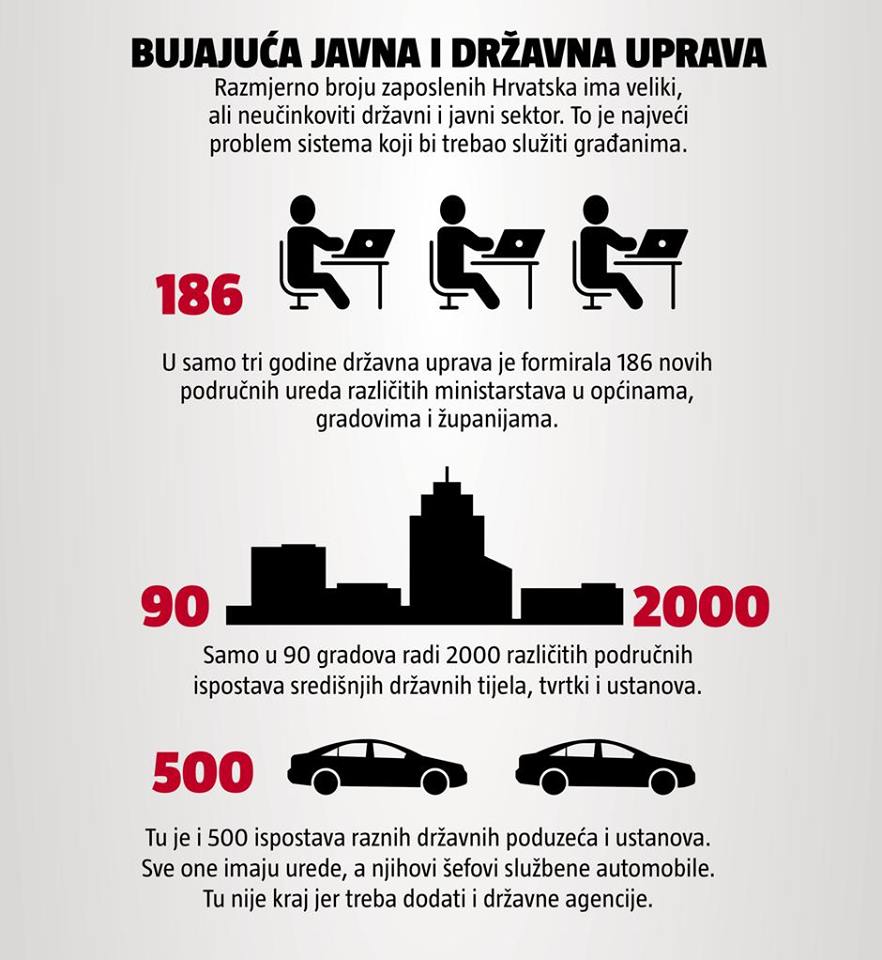Croatian Government Approves National Reform Programme: 3 Main Goals
As Poslovni Dnevnik writes on the 30th of April, 2020, on Thursday, the Croatian Government approved the National Reform Programme for 2020 and the convergence plan for both 2020 and 2021, which, in terms of economic policy, contains three key objectives - sustainable economic growth and development, linking education to the needs of the labour market and the sustainability of public finances.
To achieve these goals, 25 economic policy measures have been identified, grouped into 10 reform priorities.
These priorities are aimed at improving the business environment; future-oriented investment policy; improving the management of state property; improving public administration; improving the efficiency of the justice system; tweaking education and training in line with labour market needs; strengthening the framework for managing public finances and implementing fiscal consolidation; stimulating demographic revitalisation; improving the welfare system and ensuring the financial stability, sustainability and quality of the Croatian healthcare system.
The implementation of the measures is foreseen through 75 activities.
The programme also defines ten measures to achieve national targets under the Europe 2020 strategy in five different areas: employment, research and development, climate change and energy sustainability, education and the reduction of poverty and social exclusion.
Prime Minister Andrej Plenkovic said at the cabinet session that the programme was a reflection of the continuity of the Croatian Government's policy, but also a reflection of functioning in these new circumstances caused by the coronavirus pandemic.
Croatia's GDP is expected to fall by 9.4 percent.
The Croatian Government's convergence programme projects a GDP decline of 9.4 percent for this year and a recovery of 6.1 percent for next year. All components of Croatia's GDP, except government spending, will be slashed this year, said Finance Minister Zdravko Maric.
The general Croatian Government's budget is expected to record a deficit of 6.8 percent of GDP, or 24.8 billion kuna, in 2020, and in 2021, a general government budget deficit is projected to fall to 2.4 percent of GDP.
Based on the fiscal balance of the general government budget, public debt to GDP is expected to grow by 13.5 percentage points in 2020 when compared to 2019 and will amount to 86.7 percent of GDP, largely due to increased demand for borrowing due to the negative fiscal impact caused by the ongoing coronavirus pandemic.
In 2021, with the general government budget deficit narrowing to 2.4 percent of GDP and strong economic growth, public debt is expected to reach 83.2 percent of GDP, down by 3.5 percentage points when compared to 2020.
Consumer prices are projected to fall slightly in 2020, by 0.3 percent year-on-year.
The Croatian Government estimates that the introduction of the Croatian Employment Service's support for job retention will significantly reduce the impact of the negative shock on employment, with a 3.3 percent drop in employment expected throughout 2020, with an average unemployment rate of 9.5 percent in 2020, and of about 9 percent in 2021.
With respect to fiscal developments, direct budgetary aids are estimated at 14.9 billion kuna, which include the deferral of direct taxes and contributions, the write-off of direct taxes and contributions, the deferral of the 2019 annual income tax liability, aid when it comes to the maintaining of job positions and the procurement of medical and protective equipment to combat COVID-19, a price tag of 14.9 billion kuna has been estimated.
In addition, over 15 billion kuna was secured for favourable lending to entrepreneurs and businesses through HBOR and HAMAG BICRO programmes, and there is currently a 17 billion kuna moratorium on loans.
Croatia is much more prepared than it was back in 2008.
Minister Maric emphasised the fact that the main context of the adoption of the national reform programme for 2020 and the convergence plan for 2020 and 2021 are the devastating economic effects of the global coronavirus pandemic, but stressed that Croatia has dealt with the current crisis much more readily than it did when the global economic crisis of 2008 hit the country.
He recalled the fact that Croatia has had a surplus in its balance of payments account for several years, that its foreign debt was in a downward trajectory, and that it had achieved a budget surplus for three consecutive years, as well as a reduction in the share of public debt in GDP.
In addition, Croatia has introduced rapid and strong support to the private economic sector and achieved an enviable epidemiological picture, Maric added.
Make sure to follow our dedicated section for more on coronavirus in Croatia. For more on the domestic political scene, follow our politics page.
What Changes has Coronavirus Forced in Croatia? From Schooling to Taxes...
As Poslovni Dnevnik writes on the 30th of April, 2020, perhaps the Croatian healthcare system and the long waiting lists will be helped in some way by the coronavirus pandemic, because it seems that this virus has forced reforms we have been waiting for for a very long time. For years, changes have been promised by politicians from across the spectrum, but they were actually brought in by something invisible.
Suddenly, one can work from home, all of a sudden, everyone thinks we have too many counties and that this is pointless, suddenly the self-sufficiency of agriculture is a daily issue for everyone. Suddenly, everything can be done online in Croatia, RTL writes.
The state has been promising reforms for a very long time, and there has always been a lack of a piece of paper here and there, as well as a few stamps, which are longstanding symbols of Croatian bureaucracy. And then came the coronavirus pandemic, infecting the old and the young, and bringing about the reforms we dreamed of with it.
"We have five money-related foreclosure services where a user can open a secured account, submit a payment request, or cancel a payment request. They can submit a query or a complaint, anything for which they'd usually come to the counter,'' said Andrea Kajtaz, of commercial digital solutions at FINA.
There is almost no need for us to hold a ballpoint pen (which is probably also rapidly running out of ink and no longer has a lid) in our hands anymore either, as coronavirus has made digital signatures a reality. Has the pandemic really, finally given us a digital Croatia?
As of 2017, the Ministry of Health has has a system in place that few have actually used, it was so important to former Health Minister Milan Kujunzdic that, well... it is only just being presented this week. As has unofficially been found out, through that system, a patient will receive a username from a doctor and on the zdravlje.net (health.net) site through which they will be able to renew prescriptions for approved medicines themselves! And that's not all, according to the findings, patients will not be required to go to the hospital or to a doctor for a discharge letter, but instead they will be available online. This revolutionary for Croatia in 2020.
Admit it, you're missing those delightful trips to the tax office with your hands full of meaningless papers! Although they have been digitised through the ePorezna system for some time, for many things you have still needed to physically go to the tax office to explain your problem to a completely disinterested employee who is irritated at you for interrupting her Solitaire playing session. That used to be the Croatian reality, at least until the coronavirus epidemic broke out. As many as 20,000 new users have signed up for ePorezna during the quarantine period. Tax deferral requests can also now be submitted online.
''Over 100,000 of these requests have been resolved at this moment in time, with 100,000 applications received. Just over 7,000 of them were rejected, unfortunately, there were double submissions amounting to about 12,000. Based on these requests, the payment of the amount of 1.7 billion kuna has already been delayed,'' said Tax Administration Director Bozidar Kutlesa.
E-Passes linked health, police and the economy together, but also let the spirit out of the bottle. It's crystal clear now - we need fewer counties and municipalities. Croatia has 428 of them and much larger and much richer Germany only has 295. Experts suggest five regional units and the total abolition of some municipalities.
Thanks to the coronavirus pandemic, suddenly we're all able to work from home. 69 percent of employees are now working from the safety of their homes now. Before coronavirus came knocking at Croatia's door, those who suggested working from home were called lazy, and today this is more than acceptable to most Croatian bosses. Admittedly, the Croatian Labour Law doesn't actually yet recognise this, so employers propose that working from home is also properly and officially made legal in the eyes of the law.
With the first wave of layoffs, there were also big queues in front of the Employment Bureau. And since this is a risky epidemiological situation, the Bureau asked all those wishing to register to submit their request by mail.
What we eat matters. The coronavirus pandemic has once again confirmed that we need to be far more self-sufficient than we are. Croatia produces enough cereals, beef, tangerines and other products to meet its own needs. We have the resources, we just need a plan and the political will.
Students will complete their school year at home, at least most of them. Classes are held online or via television. Who would have ever thought something like that would be possible in 21st-century-hating Croatia? With its masochistic adoration of paper, stamps, signatures, photocopies and the need for the presentation of an ID card before you can even get a conversation, coronavirus has shown that when it comes to digitalisation, Croatia is a country that can, and should.
Make sure to follow our coronavirus section for all you need to know about the pandemic in relation to Croatia.
Croatia Can't Wait Any Longer, Reforms Are Needed Urgently
April 26, 2020 - Croatia is at a great turning point: continue on with the old ways, or take a new path of reforms.
As 24sata writes on the 25th of April, 2020, in spite of the gravity of the situation in which we've come to find ourselves because of the coronavirus pandemic, which has been intensified by the recent Zagreb earthquake, today, Croatia has a chance that is rarely presented: the nation's dysfunctional, inefficient and expensive institutions, functions and positions that are all too often merely self-serving and nothing more, can be replaced by a more efficient apparatus that will actually be of genuine service to the whole society.
Croatia can begin by streamlining its vast network of municipalities, cities and counties, as well as numerous state institutions and their affiliates - which are equally important - then it can abolish its forced chamber contributions and reduce or completely eliminate several hundred para-fiscal levies; the abolition of that part of the administration alone will contribute to making the Croatian state far more efficient than it is now.
The sheer abundance of people working in the public sector is needless: efficiency is essential to the creation of new value and economic growth. However, Croatia's public institutions are inefficient. We have a public sector which is twice the size of that of Italy, and much larger than that of Greece, even before its collapse. Maintaining the current situation by borrowing, knowing that this year we'll face a terrible decline in GDP, in the next few years we'll enter into the troubled waters of bankruptcy and be forced to sell everything we have left. From Croatian water, to its forests and islands, through to hotels and land, to the airports and even the energy system.

Croatian financial sovereignty will be taken over by the IMF and the European Commission (EC). Whoever doesn't believe such a story only has to take one look at nearby Greece. Should we go down that route? Foreign owners can, of course, be more rational in managing their businesses because they want to maximise any profits for themselves, their companies, and the country they themselves come from. But, if they can be rational and good masters, why can't Croats do that for themselves? Showcasing public spending - from municipalities and cities to the very state - that is, what residents' money is spent on, publicly and accessibly online, is a much stronger guarantee of transparency than the swearing in of even the most ''honest'' politicians. Everything that is not actually a state secret should be fully disclosed.
Changes are also the ultimate issue of actual, real patriotism. Today, Croatia is fighting for reforms that will allow the economy to breathe more easily, for the benefit of all of us who live here. Zagreb will rebuild after the earthquake; Croatian agriculture got given a chance, and Croatian crafts and industries will also eventually get that same chance. The recovery of the global and European economy after the coronavirus epidemic leads us to the conclusion that there will be money available; and Croatia needs to spend it on development projects, on production, on irrigation, and on exports. All of the leaders of the leading Croatian parties, as well as the Croatian public, need to make themselves clear about these moves, because this regards the very fate of the country. There are no neutral positions to be taken here. And it won't be a one year task, these changes will take a very long time to come to fruition.
The crisis we have found ourselves in could be the biggest opportunity for positive change in this country since Croatia gained its independence from Yugoslavia.
During the coronavirus epidemic - and this impression was later confirmed by the Zagreb earthquake - it was clearly shown that Croatia has an abundance of hardworking, dedicated people for whom nothing is too much trouble, and their duties are sacred ones (doctors, firefighters, teachers, nurses, drivers, salesmen, bakers, postmen, pharmacists - people who society would miss terribly if they went on strike). Farmers and OPGs have moved at a rapid pace to a new business model that included digital advertising and home deliveries. Schools and the media have completely switched to a new regime. Students created the world's currently most sought-after goods, masks and other virus protection equipment, despite their demanding studies.
Unfortunately, in the clear light of day, this situation has proven that for many people, the effect of a great number of people not being allowed to go to work wasn't even felt. Entire sectors of the economy were left to simply fend for themselves even though businesses had been forced for years to finance expensive institutions - through their extortionate taxes, parafiscal levies, chamber membership fees and so on... so they had to organise themselves - all on their own.
After the earthquake, Zagreb had to be cleaned up by the army. Although the city itself already has an "army" of people sitting in its offices - more specifically 24,000 people - but we've mainly only ever actually set eyes on those working for Cistoca and the like - people with regular day jobs.

The Croatian Government will certainly find itself in a difficult situation: the budget will be 45-70 billion kuna short due to the massive drop in tourism and the rest of the economy, which makes up half of the state budget. GDP could be completely halved. Of course, due to the obvious interest of those in power and other parties and the upcoming elections, it's possible for the Croatian state to borrow money and keep the whole public sector intact - both municipalities, counties, cities, chambers, agencies, offices, administrations and public companies. But, by maintaining the existing balance, Croatia will reach an abyss.
The Croatian economy won't be able to bear the burden of debt repayment if it does so, and in the next few years, it will experience (yet another) economic collapse. That perspective is more than certain. In that case, what the bankers call "collateral" - the guarantees of debt repayment - will suffer. After the Greek collapse of not so long ago, a fifth of the public sector was out of work and a fifth of the private sector also was. All this could have prevented had the Greeks undertaken the much needed reforms on time, but they didn't. An irresponsible government failed to prevent that now infamous collapse, it merely delayed it and made it more difficult when it did happen.
Can the Croatian Government - not just the current one, but the next one, or the ones after that, afford to take such a risk? It marks the signing of a delayed capitulation, the sale of national interests in installments. The government can, of course, do so if it cares only about the political perspective of the ruling coalition and their party people; it can, if it wants to replace the future of the children with the safety of their staff, because of clientelism. But is the government allowed do that? If Croatia is truly at the government's heart, it should not and will not. If we don't take care of the perspective of national development ourselves, we have no right to enjoy the illusion that foreigners will do that for us, or do it even better than us.
The rationalisations that Croatia can - and must - now undertake on its own, with the will of the government, can effectively prevent such a scenario in a timely manner.

Croatia needs to start rationalising the costly network of 576 local and regional self-government units. Croatia needs to reduce or abolish most para-fiscal levies. Croatia must allow entrepreneurs and business owners, craftsmen, farmers and those in various professions the right to freely pay membership fees to vocational chambers. Croatia needs to streamline the network of agencies and regional offices. Croatia needs to place all of the operations involving the state budget of the central government, and local governments, online. This must be done because the people have become suspicious and are too often convinced that this money will only be misused otherwise.
Transparency is a means of reducing corruption but also a means of preventing excessive spending - we will then all know about everything that goes on in the public sector, there will be no hidden sinecures or meaningless projects.
Transparency is a universal remedy for all of that. We need to digitise every administrative service that can be provided in digital format. We need to incorporate VAT collection upon implementation permanently into law: this will, more than anything else, force state institutions to carry out the jobs they're actually being paid for, it will raise the level of ''hygiene'' in various areas, from business to the judiciary. The catalog of changes Croatia needs is thick and has many, many pages. It only takes courage to bring it to life. And that courage will be rewarded, because the people want it, much like cowardice and hesitation will be punished.

Croatia is a country, a place for five, six, ten million people, who could live in prosperity. The state we've had so far - namely, governments - has reduced the number of people living in the country from 4.6 to 4 million. If we reach 80 percent of our current (per capita) income (per capita) compared to the EU, we will put a halt to that emigration, and possibly encourage people to return.
Only an economically strong country is truly sovereign.
The future of all of us depends on which direction the Croatian Government will take. Tens of thousands of people are returning to Croatia because of the recession across Europe. Let's make sure they stay here when they get off the plane. Let's give them what they asked for here: an effective state apparatus, compliance with the laws, treaties, rights, a secure prospect of economic progress, reasonable taxes that will feed an efficient state apparatus that will not have entire colonies of well-paid party personnel who don't actually do anything, and whose futility is clearly put on display as soon as some serious temptation arises. Then, new people will come. Parts of the diaspora will return. Asylum will be sought in Croatia, where currently, even endangered migrants don't want to stay permanently.
This is a referendum for what kind of Croatia we truly want, and the outcome of that referendum will dictate what our lives will become in the years to come. We need reforms, and we need them now.
For more, follow our politics page.
Croatia Performing Poorly with Reforms, Tax Burdens Continue to Cripple
As Novac writes on the 6th of June, 2019, fiscal consolidation, investment and business barriers and the burden on the Croatian economy make things very difficult for business in Croatia, according to the results of HUP Skor for 2018, showcased by the Croatian Employers' Association (HUP).
It is a tool to measure the progress of reforms in the twelve critical areas necessary for doing better business and improving life in the Republic of Croatia when compared to the EU 10.
As Gordana Deranja, HUP's president, explained, "HUP Skor is an objective measure of how much we're really reforming."
Since the countries of central and eastern Europe progressed faster than Croatia last year, Croatia's HUP Skor for 2018 is a rather embarrassing 36 out of the possible 100 points, and what continues to push Croatia to the bottom, as was stated by HUP, are taxes and similar burdens. The ratio of general government tax and social contributions to the GDP in Croatia is continuing to rise, and even now it's exceeding the maximum achieved before the reforms in the tax system.
''Structural problems continue to pose a serious threat to adaptation to one of the next crises and permanently limit the speed of economic growth. Although we're satisfied that [Croatia's] GDP grew by 3.9 percent in the first quarter of this year, the fact is that this is still too little and we should be at least four percent more in the long run,'' Deranja said.
"The Croatian economy is the most burdened and that's reflected in its productivity. The economy is congested and has no power to grow," she said.
In addition to the above-mentioned problematic areas in the Croatian economy, the encouragement of investment, productivity and competitiveness, the justice system and the labour market, education, health and pension systems continue to be ''in the red''.
''This year's result suggests that Croatia is lagging significantly behind the EU member states from Central and Eastern Europe, and what's particularly worrying is the fact that Croatia's score is worse than that in countries which are less developed than Croatia, such as Bulgaria and Romania,'' said Davor Majetić, Director of HUP.
Follow our dedicated business page for much more.

